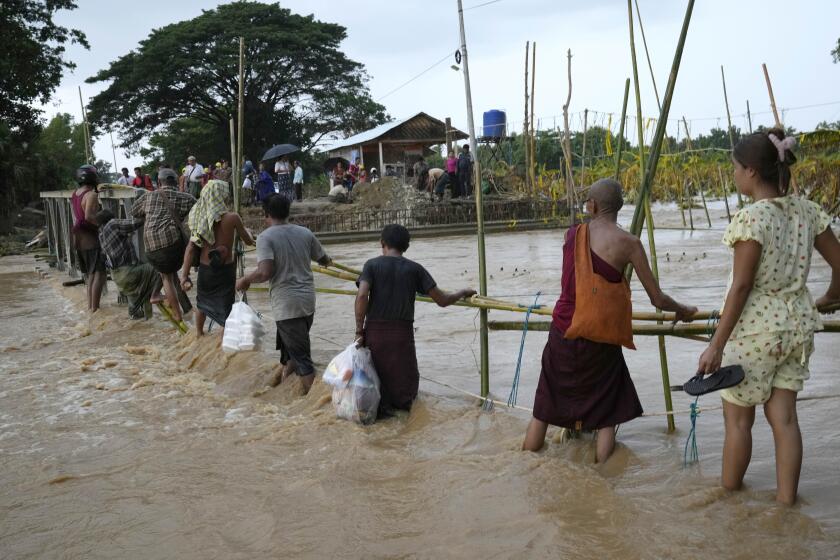Georgia Official Affirms “Fraud” in Vote
The top security official in the former Soviet republic of Georgia called Friday for new parliamentary elections as a compromise solution to the countr’s political crisis.
National Security Council chief Tedo Japaridze acknowledged “vote rigging and fraud” in balloting early this month but said the officially chosen parliament should be allowed to convene pending early elections to pick a replacement.
Opposition leaders, however, vowed to press on with protests aimed at preventing the new parliament from opening as scheduled today. They said they feared the proposal for lawmakers to convene was aimed at installing a regional strongman allied with President Eduard A. Shevardnadze as the beleaguered leader’s successor.
“I recommend that the president resign today. It will be too late for him to do it tomorrow as we’ll force him to leave as a result of a bloodless ‘velvet revolution,’ ” key opposition leader Mikheil Saakashvili told reporters as he arrived in Tbilisi, Georgia’s capital, with a column of honking cars bringing hundreds of regional supporters to join the protests.
Rival street rallies were underway Friday evening a few hundred yards from each other in the city’s center. One was in support of Shevardnadze and his ally Aslan Abashidze, leader of the Revival Union and head of the autonomous Adzharia region on Georgia’s Black Sea coast. The other backed opposition leaders.
Fears were high that the two groups might clash, potentially pushing the country into a spiral of violence and perhaps civil war. Rumors are rife that many of the Abashidze supporters are armed off-duty police from his region; pro-government politicians have previously accused opposition protesters of carrying weapons.
“There is a real prospect of bloodshed,” Japaridze said at a news conference broadcast on Georgian television. “I want to publicly call on everyone, whoever is planning bloodshed: If the country plunges into disorder, if blood is shed, none of you should hope that you will achieve your goals. No one will be able to retain power obtained at the expense of innocent people’s blood.”
Japaridze, who is coordinator of the national police and other security forces, said that if violence erupted, “no one should entertain the illusion that the bloodshed could be stopped quickly.” He warned that it would be “much more dangerous” than the brief civil war in the 1991-92 winter. That fighting led to the ouster of the country’s first democratically elected president and an invitation from victorious military leaders to Shevardnadze to assume power.
Today’s events are critical because if the parliament meets, it could elect Abashidze as its speaker, Shevardnadze could then resign, and Abashidze would become acting president. If Shevardnadze were to resign without the new parliament convening, then incumbent Speaker Nino Burjanadze, a key opposition leader, would be his interim successor.
In the Nov. 2 elections, the pro-Shevardnadze bloc took enough seats to control parliament. Opposition parties contend that an honest count would have given them control.
“The parliament handpicked by Eduard Shevardnadze may try to elect Abashidze speaker, following which Shevardnadze could resign and call early presidential elections,” Zurab Zhvania, a leader of the opposition Burjanadze Democrats, told reporters in Tbilisi on Friday. If this “cunning scheme” goes forward, “tyranny will rule Georgia,” he said.
U.S. State Department spokesman Adam Ereli said in Washington on Thursday that the election results reflected “massive vote fraud” in the area controlled by Abashidze and some other regions. The official results “do not accurately reflect the will of the Georgian people,” Ereli said.
Mark Mullen, the Georgia director of the Washington-based National Democratic Institute, which promotes democracy around the world, said in a telephone interview from Tbilisi that there are “all sorts of different ways” that the newly elected parliament might be able to “prevent a peaceful electoral transfer of executive power” when Shevardnadze’s term expires in 2005.
“That parliament is different from the one the population voted for, and the opposition and a large portion of the public is angry about that, so there’s a possibility of confrontation,” Mullen said. “The government forces and those sent from Adzharia are cooperating with each other quite closely. Any clashes would be between those two groups on one hand and the opposition on the other.”
Levan Aleksidze, an advisor to Shevardnadze on international legal matters, broke with the president Friday by holding a news conference at which he denounced the Nov. 2 elections as “a farce.”
Shevardnadze should have called on the Central Election Commission and the Constitutional Court to annul the elections, but instead turned “a blind eye to the abuses committed at the polling stations and to the anger of tens of thousands of voters deprived of their voting rights,” he said in remarks carried by the Russian news agency Interfax.
More to Read
Sign up for Essential California
The most important California stories and recommendations in your inbox every morning.
You may occasionally receive promotional content from the Los Angeles Times.










